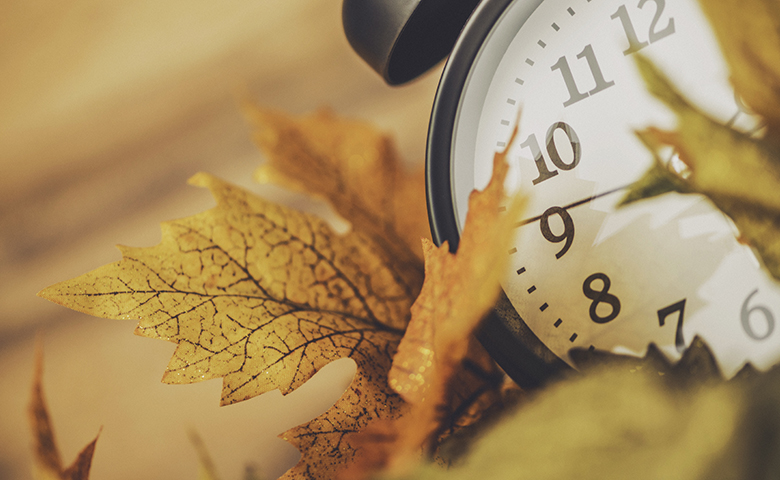The safety impacts of spring daylight saving time (DST) are well noted since an hour of sleep is lost. But what about the effects of the end of daylight saving time in the autumn?
“Fall back, spring forward” is how you remember which way the clocks go in most of North America at this time. When the clocks go back an hour in the fall it’s known as standard time, and when daylight saving time happens in the spring and the clocks go forward an hour it’s known as summer time or daylight time.
In the same way that traveling to different time zones can impact your body’s internal clock, the bi-annual flip of the clocks can do the same—even though it’s only an hour. This can affect all of the things that are done on a schedule like sleeping and eating, and the disruption can also impact your mental health.
Charles Czeisler, MD, chief of the Division of Sleep and Circadian Disorders at Brigham and Women’s Hospital in Boston, says, “It’s always good to get an hour more of sleep, as long as people take advantage of that. If they go to bed at their usual time and wake up an hour later, it will have health benefits.”
Knowing that there is an extra hour being added to the day can cause people to plan for things that their bodies need time to process. That “extra” hour is often applied across many plans, usually surpassing the amount of time allotted (it is only one hour). Because of this, the sleep debt that is created when reverting back to standard time is often far greater than when daylight saving costs an hour in the schedule. And sleep debt has known effects on type 2 diabetes, increased risk for depression, severe mood swings, mental illness, stroke and asthma attacks.
Alcohol and caffeine—both of which are known to affect sleep negatively—are often factors in further poor diet choices when it comes to reverting back to standard time. Knowledge of the extra hour being added can cause people to act differently, which includes overindulging in things you normally wouldn’t. Heavy meals later in the evening on the Saturday night before the time change can have a similar impact.
Returning to standard time in the fall means the days are shorter. Moving the clock back reduces daylight in the evening by an hour, which means the sun will rise earlier in the morning (but only for a short time as the season progresses). This can impact workplaces the same way spring daylight saving does—with a sudden and significant rise in the number of mistakes and distractions among workers because their sleep schedule has been disrupted. From a company perspective, fatigue affects employees’ safety, quality, and productivity and can significantly impact the bottom line.
Autumn (and more specifically when the time change occurs) is often when seasonal affective disorder (SAD) begins. SAD is a type of depression related to changes in seasons, and the loss of daylight plays a big factor in SAD. Symptoms include feeling depressed nearly every day, difficulty concentrating, oversleeping, low energy, food cravings (especially carbohydrates), overeating, and weight gain.
Here are some tips to help your employees overcome the adverse effects of the time change:
- Go to bed at your normal time on the Saturday night (do not adjust for the time change at 2 am). Wake up at your normal time but adjust for the time change to ensure you get an extra hour of sleep. It’s important to go to bed at your normal time on Sunday evening as well, keeping your schedule as normal as possible.
- Do not make adjustments or justifications based on the time change. For example, rationalizing that before the time change it was this time, so it’s OK to stay up later, overindulge, etc.
- Make healthy choices for meals and snacks and exercise (this includes going for regular walks). Not only will this help with the diet portion of staying healthy but it can help maintain a better sleep schedule and can improve one’s mood.
- Avoid alcohol and caffeine when it’s close to bedtime during the time change. Another thing that people often don’t think about affecting their sleep is blue light right before bed. It can impact the quality of sleep which is not something you want during the time change.
It may take a few days to adjust to the time change but sharing this information within your organization ensures the best chance that people are prepared.

